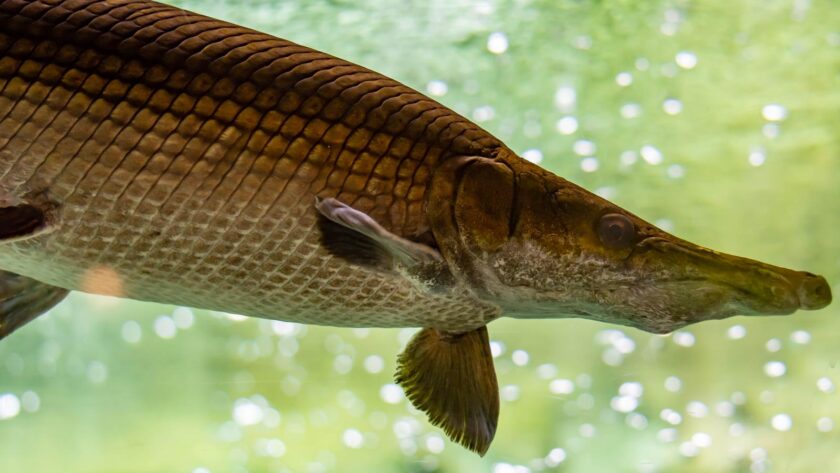Have you ever heard of an alligator gar? These unique fish are the largest of their kind, growing up to 10 feet in length and weighing up to 300 pounds. They have a long history as a game fish, but there has been some debate over whether or not they’re aggressive.
So, what’s the truth? Are alligator gar aggressive: fact or myth? In this article, we’ll explore the facts and myths behind alligator gar aggression so that you can make an informed decision about how to interact with them.
We’ll also look at their potential threats and conservation efforts surrounding these amazing creatures.
Table of Contents
Overview of Alligator Gar

These fish have an interesting history, and it’s worth learning more about them! Alligator gars are popularly known as one of the most powerful predators in freshwater environments.
Native to southern parts of the United States, they have a wide habitat range that includes swamps, marshes, lakes and slow-moving rivers. These impressive fish have long snouts with a set of strong jaws lined with sharp teeth. They can reach lengths up to 10 feet and weigh over 300 pounds!
Mating habits for alligator gar differ depending on the species; some lay eggs while others give birth to live young. Some populations migrate hundreds of miles upstream during spawning season to breed before returning back downstream when the water temperatures rise again.
Whether you’re looking for a majestic creature or just want to learn more about their fascinating life cycle, there’s no denying that alligator gar are an intriguing species worth exploring further!
The Facts Behind Their Aggression
Swimming beneath the surface of calm waters lies a creature capable of blind ferocity, an allegory for the unpredictable nature of life.
The alligator gar is one such creature, and its aggression has been captivating to scientists and laypersons alike. When it comes to their breeding behavior, alligator gars are known for being highly territorial and aggressive; they will attack any perceived threat without hesitation.
This aggression is also seen in their natural predators, which include large bass, catfish, and even other species of alligator gar. Furthermore, these creatures have powerful jaws that can easily crush shells or other hard objects with ease.
Although their aggression may seem intimidating at first glance, it’s important to remember that this behavior is rooted in self-defense rather than malice. Alligator gar are apex predators who need to protect themselves from potential harm; it’s simply part of their evolutionary survival instinct.
As humans, we should respect this instinct by giving them plenty of space while swimming or fishing near them. With patience and understanding, we can observe these fascinating animals without putting ourselves at risk.
The Myths Surrounding Their Aggression
You may have heard stories about these mysterious creatures, but it’s important to remember that not all of them are true. Alligator gar are often described as aggressive, but in reality they’re relatively shy and peaceful fish. They do become active during mating season, but their behavior is far from the level of aggression that some myths suggest:
Habitat disruption isn’t a factor when it comes to their aggression levels. Even if they’re living in an area with limited resources or poor water quality, they’ll still remain calm and docile.
Feeding habits also don’t necessarily make them more aggressive. In fact, due to their large size and slow metabolism, they rarely hunt for food and can even go long periods without eating at all!
Finally, the myth that alligator gar will attack humans is simply false; they won’t bother you unless provoked.
Alligator gar are remarkable creatures with fascinating behaviors that shouldn’t be feared or misunderstood. With proper knowledge and respect, we can learn to appreciate them for what they truly are – a gentle giant deserving of our admiration!
Alligator Gar as a Game Fish
With their impressive size and strength, it’s no wonder these mysterious creatures have become quite the sought-after game fish – after all, who wouldn’t want to catch something with such a wild reputation?
Alligator gar have been known to put up an intense fight when hooked, making them a favorite among experienced anglers. While they are not typically aggressive towards humans in the wild, they can be quite challenging to land!
When fishing for them, you’ll need specialized gear like heavy tackle and large bait. Popular catching techniques include trolling with live or artificial lures as well as using cut bait or big night crawlers on the bottom.
As for bait preferences, these fish generally feed on smaller prey such as frogs and minnows; however they’re also known to take larger snacks like large shiners or even ducks! With some patience and determination, you can experience the thrill of catching one of these unique fish – just don’t forget your camera!
Potential Threats to Alligator Gar
Though they may appear intimidating, alligator gar face many potential threats to their survival, from over-fishing to habitat destruction.
Alligator gar are a species of fish that inhabit the waters of North America and have been around for millions of years. They have adapted to their environment by developing unique breeding behaviors and habitat preferences. Unfortunately, these adaptations are not enough to protect them from human activities that threaten their existence.
Over-fishing is one of the biggest threats facing alligator gar populations today. As a result of commercial fishing operations, large numbers of alligator gar are being caught and sold as food or bait. This has caused a drastic decline in the number of adult fish in some areas, leading to fewer young fish being born each year.
In addition, habitat destruction due to pollution and development has also had an impact on alligator gar populations by reducing the amount of suitable spawning grounds available for them. These factors combined have put this species at risk for extinction if nothing is done soon to protect them from further harm.
Are Alligator Gar Aggressive: Conservation Efforts
The future of these ancient creatures hangs in the balance, and conservation efforts must be taken to ensure their survival.
Alligator gar have been facing a number of threats, primarily from habitat destruction and overfishing. Conservationists are calling for stronger protections for alligator gar habitats, such as establishing protected areas or refuges that allow them to flourish beyond the danger of human interference.
In addition to habitat protection, other efforts are being made to protect alligator gar populations. For instance, state regulations have been put in place to reduce fishing pressure on this species and limit the size and number of catches allowed per person.
Additionally, some states have banned the sale or transfer of alligator gar eggs or juveniles so that their population can remain healthy. Overall, these conservation measures represent an important step in preserving this unique fish species for generations to come.
Summary of Alligator Gar Aggression
You may have heard stories of these ancient creatures being aggressive, but it’s important to understand the truth behind alligator gar behavior. Alligator gars are considered semi-aggressive fish, meaning they generally stay away from humans and other animals unless provoked or threatened.
While they can be intimidating due to their size, alligator gars rarely attack people. They do, however, have particular habitat preferences and diet habits that should be respected in order to avoid an altercation with one of these powerful fish.
When observing alligator gar in the wild, it is important to remain cautious and respectful around them. It is also important to keep a safe distance when fishing for them as they can be very territorial when feeding or spawning.
Alligator gar are typically not aggressive towards other creatures unless threatened or provoked by another animal or human being. By understanding the behavior of this species and respecting its habitat, we can help maintain healthy populations and coexist peacefully with these majestic prehistoric creatures!
Frequently Asked Questions
What kind of environment do Alligator Gar prefer to live in?
You’ll never believe the natural habitats of alligator gar! They can be found in some of the most exotic places, from slow-moving rivers and bayous to brackish coastal marshes.
And they have unique feeding habits – they use their long, slender snouts like noodles to slurp up anything that looks tasty! But these remarkable fish prefer shallow waters near vegetation, providing a safe haven to hide amongst the underwater grasses and lily pads.
So if you’re looking for an adventure with a wild twist, head out on the water and search for this captivating creature in its preferred natural environment.
How large do Alligator Gar typically grow to be?
Have you ever wondered how large Alligator Gar can grow? These amazing fish can grow up to 8 feet in length and weigh as much as 200 pounds! Their size is largely due to their feeding habits, which include a diet of other fish, crustaceans, and even small mammals.
The spawning season for Alligator Gar typically begins in the springtime when water temperatures start to rise. With proper care and nutrition, these fish have the potential to reach their maximum size!
Do Alligator Gar have any predators?
Are you curious about the predators of the alligator gar? You’ll be surprised to learn that these massive fish have quite a few hunters in their natural environment!
Boating enthusiasts often spot bald eagles, as well as raccoons and river otters, diving down into the water to catch them. Even snapping turtles are known to feed on alligator gar eggs during breeding season.
Feeding habits also draw in some large gamefish, such as largemouth bass and channel catfish. The alligator gar has adapted this way over thousands of years—but it still needs our help as humans to protect its habitat from destruction.
What is the best way to catch an Alligator Gar?
If you’re looking for a thrilling outdoor adventure, nothing beats the challenge of reeling in an alligator gar!
To give yourself the best chance of success, it’s important to select the right tackle and bait. Opt for heavy-duty rods with large reels and lines for tackle selection.
For bait preferences, alligator gar are often attracted to live fish or cut baits such as shad or mullet.
With your gear prepped and ready, you can cast out into the water and wait for one of these remarkable creatures to take your offering!
Are Alligator Gar dangerous to humans?
You may think of alligator gar as harmless creatures, but they can be dangerous to humans if provoked. These large fish have powerful jaws and razor-sharp teeth. In addition, their eating habits include preying on smaller animals. When mating behavior kicks in during spawning season, their aggression is heightened. It’s best to keep a safe distance from these predators.
However, with the right knowledge and fishing techniques, you can safely land an alligator gar with minimal risk of danger. So if you’re looking for an adventurous challenge or want to provide sustenance for your family, alligator gar are worth considering!
Conclusion
You’ve learned about alligator gar—their aggressive tendencies, the myths that surround them, and even their conservation efforts.
The truth is that these fish are not as aggressive as many believe; they don’t go out of their way to attack humans.
However, they can still be a formidable presence in the water if you decide to take them on as a game fish.
With careful management and conservation efforts, we can ensure this species survives for generations to come.
So whether you’re an avid angler or just looking for a peaceful swim with the wildlife, remember: alligator gar are worth respecting—but fear isn’t necessary.


